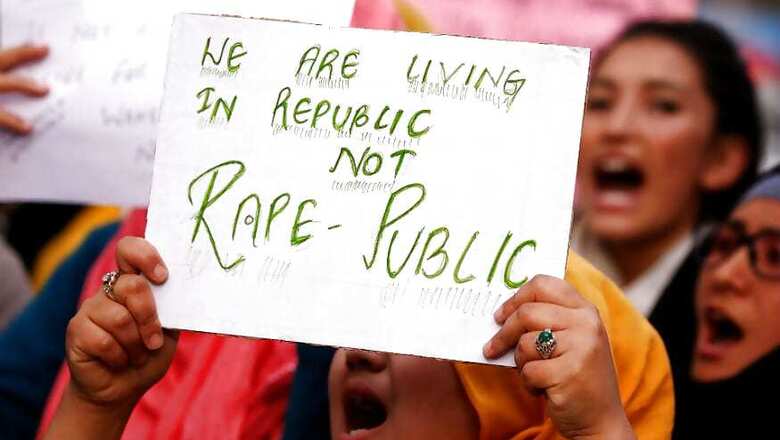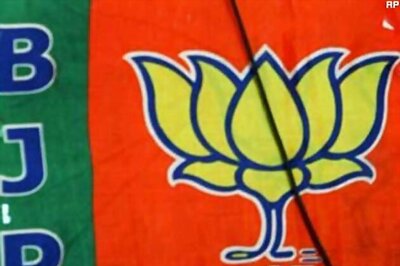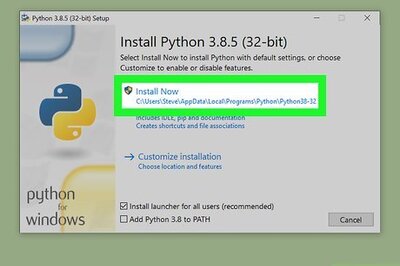
views
New Delhi: Following the huge outrage over the gang-rape and murder of an eight-year-old girl in Kathua, the Union Cabinet on Saturday approved the promulgation of an ordinance to allow courts to award death penalty to those convicted of raping children up to 12 years of age.
The criminal law amendment ordinance seeks to amend the Indian Penal Code (IPC), the Evidence Act, the Code of Criminal Procedure (CrPC) and the Protection of Children from Sexual Offences (POCSO) Act to introduce a new provision to sentence convicts of such crimes punishment of death.
The ordinance will now have to be replaced with an amendment bill in Parliament within the next six months.
Here’s a look at what the new rules entail:
— Minimum punishment in case of rape of women has been increased from rigorous imprisonment of 7 years to 10 years, extendable to life imprisonment.
— In case of rape of a girl under 16 years, minimum punishment has been increased from 10 years to 20 years, extendable to imprisonment for rest of life, which shall mean imprisonment till that person’s natural life.
— The punishment for gang rape of a girl under 16 years of age will invariably be imprisonment for rest of life of the convict.
— Stringent punishment for rape of a girl under 12 years has been provided - minimum 20 years’ imprisonment or imprisonment for rest of life or with death.
— In case of gang rape of a girl below 12 years, punishment will be imprisonment for rest of life or death sentence.
— Time limit for investigation of all cases of rape has been prescribed, which has to be mandatorily completed within 2 months.
— Time limit for completion of trial of all rape cases has also been prescribed and it has to be necessarily completed in 2 months.
— 6 months’ time limit for disposal of appeals in rape cases has also been prescribed.
— It has been prescribed that there will be no provision for anticipatory bail for a person accused of rape or gang rape of a girl under 16 years.
— Special forensic kits for rape cases to all Police Stations and hospitals.
— Dedicated manpower will be provided for investigation of rape cases in a time bound manner.
— National Crime Records Bureau will maintain a national database and profile of sexual offenders.
— This data will be regularly shared with States/UTs for tracking, monitoring and investigation, including verification of antecedents by police.
— It has also been provided that court has to give notice of 15 days to Public Prosecutor and the representative of the victim before deciding bail applications in case of rape of a girl under 16 years of age.
The move comes against the backdrop of the rape and murder of minor girls in Jammu and Kashmir's Kathua and Gujarat's Surat district recently. But even while the Cabinet led by Prime Minister Narendra Modi was meeting on Saturday morning to discuss the issue, the rape and murder of a four-month-old infant in Indore sent fresh shockwaves across the country.
The ordinance was signed within hours of Modi’s return from his five-day foreign tour.
The Cabinet also reportedly cleared the Fugitive Economic Offenders’ Ordinance, which will let the government confiscate pthe roperty of economic offenders who flee the country.
The government had made its intention on the ordinance apparent on Friday. In a letter submitted to the Supreme Court, the Centre had said that it had started the process to amend the POCSO Act to ensure maximum punishment of death penalty in child rape cases where the victim is under 12 years of age.
Outrage poured from international and national quarters after the horrific details of rape and murder of an eight-year-old girl were reported. The huge public anger was not just against the crime itself but the purported involvement of two senior BJP lawmakers, who were later sacked, to shield the accused.
After being repeatedly challenged to speak on the issue, PM Modi finally broke his silence on April 13, nearly three months after the victim’s dead body was found in Rasana, Jammu on January 17.
Even after the BJP acted against these leaders, there has been a huge anger against the frequency with which these incidents are being reported across the country.
Over the last couple of days, rape and murder of children 12 years old or younger has been reported from four other places in the country — two from Etah, one from Surat, one from Chhattisgarh and another from Odisha.
Following pressure by the opposition, Maneka Gandhi, the Union minister for Women and Child Development, was the first cabinet minister in Modi government to propose changing the law last week. The proposal was made by the Home Ministry on Saturday.
Reacting to the developments at 7 Lok Kalyan Marg, Trisha Shetty, lawyer and founder of an NGO Shesays, an NGO working against sexual abuse, said, “What we need is swift justice and not da eath penalty. Government and judiciary must ensure that the fast track courts are really working. So far all politicians and governments have failed us in this aspect.”
Shetty is not the only activist, several others have also argued against awarding death penalty in similar rape-and-murder cases.
Experts often point out the low conviction rate in such incidents. On an average only 3 out of 10 men charged with raping minors are convicted. The remaining 70 per cent people walk free. This meant that 5,700 people accused of raping minors were acquitted while only 2,241 were convicted in 2015.




















Comments
0 comment